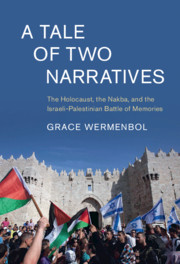'There is vast literature on the Holocaust memory in Israel and there is vast literature on the memory of the Nakba among Palestinians. But there are hardly any thorough fact-based analyses of both these foundational memories together and the ways by which they shape and reshape each other. Grace Wermenbol’s brilliant study does precisely that and proves that in order to understand each of these memories one actually needs to study them both and together.'
Amos Goldberg - The Hebrew University of Jerusalem
'A Tale of Two Narratives is the first rigorous comparative and relational study of memorialisation practices of the Holocaust and Nakba in Israel/Palestine. Wermenbol approaches this challenging topic with critical precision, illustrating how both Israelis and Palestinians shape the memory of their own foundational trauma in implicit and explicit conversation with their 'enemy'.'
Yair Wallach - SOAS, University of London
‘In no conflict does the war of narratives play a bigger role than in the Israeli-Palestinian conflict. This is closely related to a distinctive feature: each side in this conflict draws upon a discourse of victimhood – that of a past Holocaust whose repetition needs to be permanently averted and that of an ongoing Nakba that requires to be urgently terminated. This book is a brilliant contribution to the topography of that minefield, and hence a major contribution to enabling its future demining.’
Gilbert Achcar - author of The Arabs and the Holocaust: The Arab-Israeli War of Narratives
‘Based on impressive field work, the book presents a meticulous analysis of the mnemonic practices and constructions of the past, offering a welcome contribution to our further understanding of both the general matter of the uses of the past and critical aspects of the Israeli-Palestinian conflict.’
Yaacov Yadgar - Stanley Lewis Professor of Israel Studies, University of Oxford
‘This is an outstanding and innovative study of how both Palestinians and Israelis interpret and perceive themselves. The scope of the material and extensive footnoting will make it valuable for students conducting further research … Highly recommended.’
B. Harris Jr.
Source: Choice Magazine
‘this is an important book, and Wermenbol’s meticulous research will be of insight and good use to scholars … It is the merit of Wermenbol to have written an important book on a most difficult topic, thus expanding the scholarship on the memory relations of the Holocaust and the Nakba.’
Alon Confino
Source: The Middle East Journal
‘… [This book] would be of interest to students and scholars of Middle East and Memory studies, identity politics, the creation of nation-states, and settler colonialism. Finally, [it] is of the utmost importance for those interested in examining the interaction of the media, press, and state in fomenting a national identity based on collective memory.’
Christina Bouri
Source: Arab Studies Quarterly



